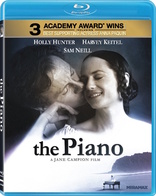The Piano Blu-ray Movie
HomeThe Piano Blu-ray Movie 
Lionsgate Films | 1993 | 120 min | Rated R | Jan 31, 2012Movie rating
7.7 | / 10 |
Blu-ray rating
| Users | 4.0 | |
| Reviewer | 4.0 | |
| Overall | 4.0 |
Overview
The Piano (1993)
In 1851, Ada, a mute Scotswoman, travels to colonial New Zealand to wed a man she does not know, with her precocious daughter Flora and beloved piano in tow. When her cold and practical husband, the landowner Stewart, refuses to transport the piano to their rural home, Ada hesitantly agrees to a sexual relationship with a neighbor, the intense George, in order to retrieve and gain access to the instrument.
Starring: Holly Hunter, Harvey Keitel, Sam Neill, Anna Paquin, Genevičve LemonDirector: Jane Campion
| Drama | Uncertain |
| Romance | Uncertain |
| Period | Uncertain |
Specifications
Video
Video codec: MPEG-4 AVC
Video resolution: 1080p
Aspect ratio: 1.78:1
Original aspect ratio: 1.85:1
Audio
English: DTS-HD Master Audio 2.0 (48kHz, 24-bit)
Subtitles
English, English SDH, Spanish
Discs
50GB Blu-ray Disc
Single disc (1 BD)
Playback
Region A (locked)
Review
Rating summary
| Movie | 4.0 | |
| Video | 4.0 | |
| Audio | 4.0 | |
| Extras | 0.5 | |
| Overall | 4.0 |
The Piano Blu-ray Movie Review
The sound of silence.
Reviewed by Jeffrey Kauffman January 23, 2012Did writer-director Jane Campion have seventeenth century British poet and playwright William Congreve in mind when
she made The Piano? Congreve isn’t widely remembered nowadays other than by English majors, but he gave
the world one of its most iconic (if quite often misquoted) phrases of all time: Music has charms to soothe a savage
breast. (Breast is quite frequently misquoted as “beast”.) While that quote in and of itself might be enough to draw a
parallel between Congreve and Campion, it becomes even more resonant when one realizes that that famous line
opens Congreve’s play The Mourning Bride, which could certainly be seen as a fitting description for The
Piano’s lead character, Ada McGrath (Holly Hunter), a Scottish widow with a young child, Flora (Anna Paquin), who is
sold by her father to an emotionally distant New Zealand farmer named Alistair Stewart (Sam Neill). Ada’s plight as she
navigates a
new world where she’s forced to marry a man she neither knows nor (obviously) loves is made even more difficult by
that fact that Ada has not spoken a word since she was a young girl. She communicates now solely through sign
language, which Flora translates, or by playing her beloved piano, which Ada has had transported, somewhat
improbably, to her new island home. Congreve’s The Mourning Bride continues:
Musick has Charms to sooth a savage Breast,
To soften Rocks, or bend a knotted Oak.
I've read, that things inanimate have mov'd,
And, as with living Souls, have been inform'd,
By Magick Numbers and persuasive Sound.
What’s ironic about The Piano is that music (with or without the “k”) does in fact soothe one savage breast,
that of farmer Alistair’s friend Baines (Harvey Keitel), a sort of benign Kurtz-like figure who has adopted the native Maori
ways, while the very same music does absolutely nothing to or for Alistair. Still, it is Ada’s preferred “language” of
choice, a delicate verbiage which seems to offer a glimpse inside a troubled but resolute soul.
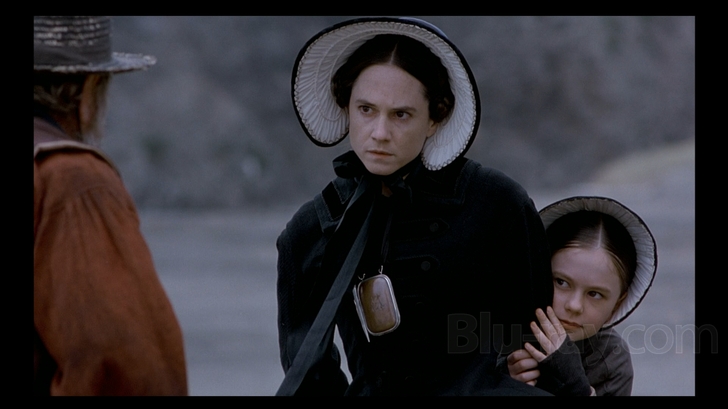
Congreve is also the author of another iconic quote from The Mourning Bride, "Heaven has no rage like love to hatred turned, Nor hell a fury like a woman scorned," which is often paraphrased into more relatively modern verbiage as “Hell hath no furty like a woman scorned.” That quote might be further modified to “Hell hath no fury like a jilted husband with a mail order bride scorned,” for that’s the gist of The Piano. The film never really explains Ada’s unwillingness to speak (it’s not an actual physical infirmity, but a willing choice), and instead has the character deliver a discursive introductory narration which she tells the audience is not the words of her mouth, but of her mind. Writer-director Jane Campion seems to want to build a film around a mystery, and Ada’s muteness, while idiosyncratic, may not actually be enough to hang a feature film on, at least not entirely. That slack is tightened considerably by the other characters, with Paquin’s Flora really carrying a lot of the film’s troubling emotional content.
What’s notable, and actually laudable, about Campion’s conception here is that Neill’s character of Alistair is really not an evil villain, and is in fact quite sympathetic for quite a bit of the film. He is ultimately pushed to an act of savage revenge, but it comes only after Ada’s continued intransigence and a certain amount of betrayal. It may not make the savagery any less disturbing, but it is in a way extremely understandable. From a performance standpoint, it’s kind of odd to see Harvey Keitel in the “softer” masculine role, while Neill evinces a slightly more hard edged character. As Ada and Keitel’s Baines fall in love, and Ada’s gift with music speaks directly to Baines’ heart, Keitel is really incredibly effective with small moments, letting a lot of expression emanate from his eyes.
Of course Oscar winner Holly Hunter is something of a revelation in this role where she only emits sighs, a little laughter and a few grunts. Otherwise this is a performance devoid of dialogue, where everything must be conveyed by body language and facial expressions, and Hunter makes Ada sympathetic against considerable odds. Ada the character is really a deeply disturbed person (something again that is not really adequately addressed), but she’s one with incredibly deep emotions which pour through her fingers into her keyboard, and somehow Hunter is able to make that reality believable.
The film does falter occasionally, first with the aforementioned lack of explanation for the central conceit, and also in a way with Ada’s breaking of the fourth wall with her narration, which bookends the film. There’s also one brief, but somewhat odd, moment where Flora is making up a story about how her mother and biological father met where Campion inserts an animated second or two that completely removes the viewer from the film. The Piano is fanciful enough in and of itself without needing any additional elements like this, and it’s a notable misstep in an otherwise tonally consistent presentation.
Campion makes the most of her exotic setting and characters, depicting a brutal, yet strangely beautiful, world full of dripping rain forests, knee deep mud and storm tossed beaches. The film manages to be surprisingly sumptuous despite the primitive living conditions on display, with a sort of pioneer spirit seeping through soggy floorboards and dirty hoop skirts. What’s rather remarkable about the film is how the emotional content is so clearly repressed for the first third or so of the film, and then erupts uncontrollably leading to a number of unforeseen consequences. Campion shirks neither from the violence nor the romance of the story, and in fact she rather incredibly manages to make The Piano play rather like a fable, a musical lullaby from a half forgotten dream.
The Piano Blu-ray Movie, Video Quality 
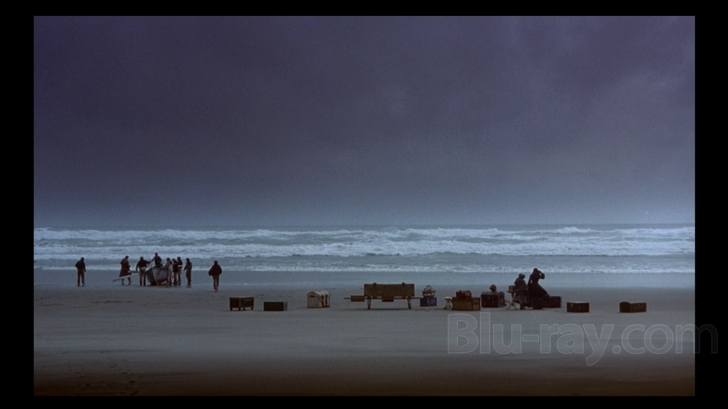
The Piano is presented on Blu-ray courtesy of Lionsgate-Miramax with an AVC encoded 1080p transfer in 1.78:1 (you'll note in the first two screencaps below that the opening sequence, which includes the credits, is just slightly windowboxed). This is another really solid release of a Miramax catalog title, one which, like Cold Mountain and The English Patient, I'd place at just a slightly inferior level to Frida and Shakespeare in Love. Grain is once again quite noticeable in this presentation, spiking considerably in the film's many dark and/or blue filtered scenes, though never rising to levels seen in The English Patient. The film overall sports a very sharp and well detailed image, with some absolutely gorgeously saturated color. The Piano is often a very dark film, with storm tossed environments and light blocked by huge overhanging trees, and while there's no significant crush here, shadow detail is sometimes lost, something which becomes something of an issue in the many dimly lit interior sequences. The image looks best in midrange and close-ups, where fine detail is well above average. The frequent blue filtering looks magnificent throughout this presentation.
The Piano Blu-ray Movie, Audio Quality 

The Piano is the first in this wave of Lionsgate-Miramax catalog release not to feature a 5.1 mix, but the good news is the film's DTS-HD Master Audio 2.0 mix boasts really surprisingly good fidelity and some decent separation. The film has some unexpected LFE, including some great roar from the water in the opening sequence when Ada and Flora make the long trip to New Zealand. The film also has a wealth of great ambient environmental sounds, including the omnipresent rain which drenches the goings on in several key segments. Despite Ada's muteness, the film actually does have some dialogue, and that is presented cleanly and clearly. This may strike some as heretical, but aside from the actual piano cues, I personally find Michael Nyman's score for the film distracting and too precious for its own good, but it sounds just fine on this track. It should be noted that there are apparently some missing subtitles here that should have been hard encoded during the sign language scenes.
The Piano Blu-ray Movie, Special Features and Extras 
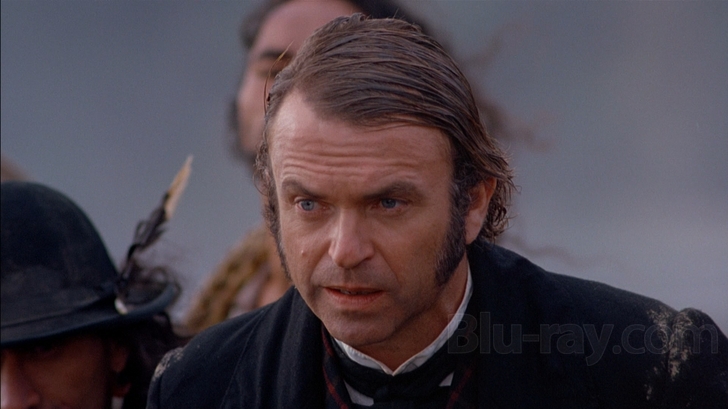
Theatrical Trailer (SD; 1:46)
The Piano Blu-ray Movie, Overall Score and Recommendation 
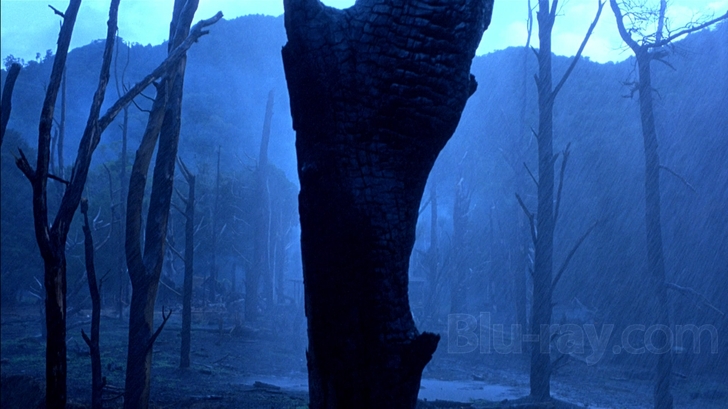
The Piano is certainly unusual on any number of levels. Campion creates several unforgettable characters in this film, and the setting is both evocative and provocative. Hunter and Paquin both earned well deserved Oscars here, but Neill and especially Keitel are no less remarkable, and Campion wisely utilizes New Zealand as basically another character. The film does have a couple of odd elements which are slightly off putting, but the overall effect here is so strange and almost hallucinatory at times that few will probably mind very much. This Blu-ray offers excellent video and audio and despite being way too light on supplemental features, it comes Recommended.
Similar titles
Similar titles you might also like

The Age of Innocence
1993

Two Lovers
2008

Bright Star
2009

The Invisible Woman
2013

Tess
1979

Little Women
2019

The Portrait of a Lady
Special Edition
1996

The Magnificent Ambersons
1942

Days of Heaven 4K
1978

Anna Karenina
2012

Albert Nobbs
2011

Bleak House
2005

Disobedience
2017

The Red Shoes 4K
1948

A Room with a View
1985

My Cousin Rachel
2017

The Paradise: Season Two
2013

Orlando
1992

The Heiress
1949

The Earrings of Madame de...
Madame de...
1953
